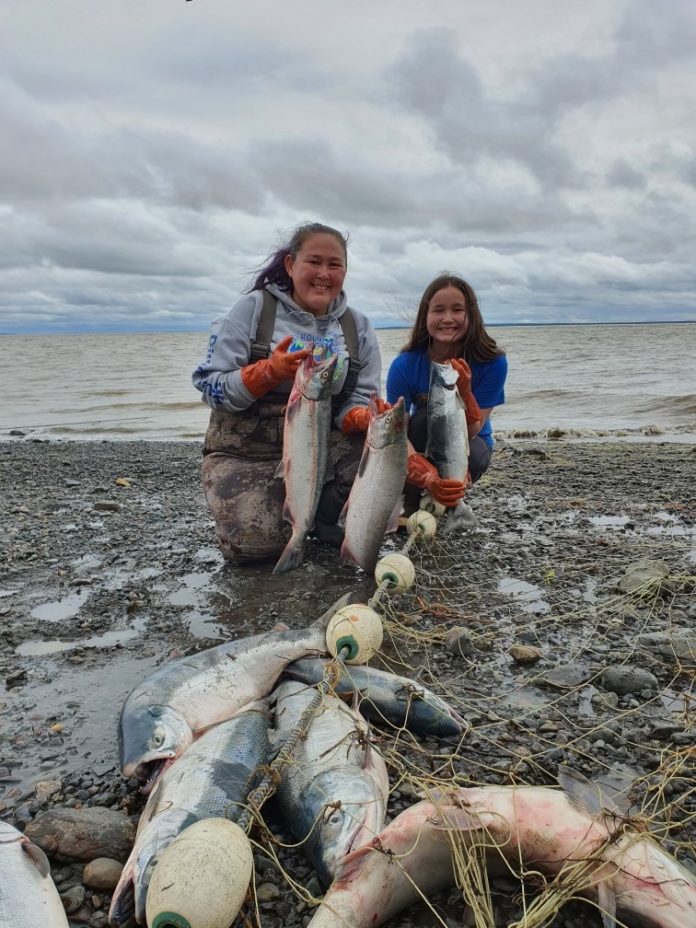
Residents of the Dillingham area in Southwest Alaska have donated over 5,000 pounds of subsistence-caught sockeye salmon for families in Yukon River communities and Chignik unable to do their own harvesting due to low salmon returns.
The collaborative effort, coordinated through the Alaska Longline Fishermen’s Association’s (ALFA) Seafood Distribution Network, will bring these red salmon to Alakanuk, Pitkas Point, Saint Mary’s, Chignik Lagoon, and Chignik Bay in the coming weeks, ALFA said in a statement issued on Tuesday. ALFA’s partners in the project include Northline Seafoods, Bristol Bay Native Association, Grant Aviation, and the Bristol Bay Native Corp.
The effort began in June before the start of the Bristol Bay commercial salmon fishery, with Dillingham residents helping ALFA collect salmon from families fishing at Kanakanak Beach in Dillingham.
Northline Seafoods, a new processor in Bristol Bay that specializes in processing and freezing whole fish, helped to oversee the cleaning and freezing of the salmon. The salmon was frozen whole, in response to requests from Yukon and Chignik communities for whole fish, so they could fully utilize the salmon and practice their food traditions. Each salmon was labeled with the name of the family that donated it.
Grant Aviation will help fly the salmon to the villages.
The fish will also be used by the Yukon River Drainage Fishermen’s Association Educational Exchange program, with several youth traveling to communities on the Yukon to share their experiences around salmon.
Natalie Sattler, program director for ALFA, said the salmon donation project was a bit of an experiment.
“We didn’t know how many people would be willing to contribute a portion of their subsistence harvest for families that they didn’t know,” Sattler said. “When people heard that we were collecting salmon for the Yukon and Chigniks, they jumped at the chance to contribute and help other Alaskans – especially those who depend on subsistence for their diet and culture. We were thrilled by the positive responses and were able to collect our target of 5,000 pounds of salmon much quicker than anticipated. We couldn’t have done it without the generous support of our partners, especially Bristol Bay Native Association, Grant Aviation, and Northline Seafoods.”
Ben Blakey, chief executive officer of Northline Seafoods, said his company was first approached in 2020 to help address the growing shortage of salmon in Alaska’s rural communities and has been involved in the Seafood Distribution Network ever since.
“Making sure local Alaskans have access to high quality seafood is incredibly important to us and we are committed to supporting the Network’s ongoing efforts to build the infrastructure and distribution systems needed to improve the resiliency and sustainability of Alaska’s local food system,” Blakey said.
The Seafood Distribution Network emerged through ALFA’s Seafood Donation Program, which initiated in March of 2020 in response to COVID-19 pandemic and its impacts on local fisheries and families.
Since then, ALFA’s Seafood Donation Program has provided more than 645,000 donated Alaska seafood meals to families experiencing food insecurity in Alaska and the Pacific Northwest.
Using funding from the U.S. Department of Agriculture, ALFA is currently undergoing a Regional Food System Partnership planning process. The goal is to develop a more long-term plan for the Seafood Distribution Network and future seafood donation efforts.





